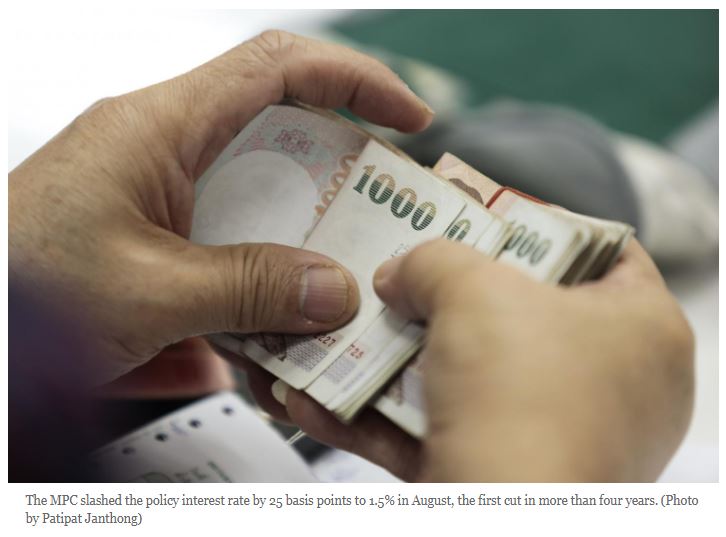Thailand: Rate cut will not slow baht appreciation
The Bank of Thailand’s Monetary Policy Committee (MPC) could cut the policy rate another 25 basis points before year-end, but the move is not expected to rein in the baht’s rising strength, says Kasikornbank (KBank).
“Another possible rate cut this year is not anticipated to mitigate the baht appreciation significantly,” said Kobsidthi Silpachai, head of capital markets research at KBank.
“The move would alleviate the pressure [for lower interest rates] in an environment where global central banks have been cutting their benchmark interest rates.”
The seven-member MPC slashed the policy interest rate by 25 basis points to 1.5% in August, the first cut in more than four years, to boost Thailand’s lethargic economic conditions.
The current rate is only 25 basis points higher than the Bank of Thailand’s record low of 1.25% during the 2009 global financial crisis.
The MPC will continue adopting a data-dependent approach to deliberate the monetary policy outlook, while the need to preserve policy space to cushion against possible future risks is necessary, according to the latest edited MPC minutes published on Sept 25.
The committee will reconvene on Nov 6 and the last meeting for this year is scheduled for Dec 18.
The baht’s value is projected to continue appreciating, possibly dropping under 30 per US dollar in the middle of next year, said Mr Kobsidthi.
Factors supporting the outlook are investors’ appetite for safe-haven assets, Thailand’s current account surplus and a possible upgrade of the country’s sovereign credit rating by international credit rating agencies, he said.
“The baht’s value could touch 29.70 during the first half of 2020 and continue appreciating to 29.20-29.30 in the second half,” said Mr Kobsidthi.
Heightening uncertainty in the global financial markets and risks related to the Sino-US trade dispute have fanned an appetite for safe-haven assets among investors, with the baht and bullion rising on fund inflows, he said.
The local currency’s strength is also further induced by Thailand’s huge current account surplus, projected at around US$34 billion, inbound tourism revenue and capital inflows, said Mr Kobsidthi.
“Exports would be the primary cause of the baht appreciation rather than imports. Although this year’s exports may not expand that much due to the global economic slowdown, next year’s imports are expected to decline as domestic investment has not accelerated,” he said.
The baht’s value is forecast at 30.50 baht per dollar this year-end, according to KBank.
Source: https://www.bangkokpost.com/business/1779294/rate-cut-will-not-slow-baht-appreciation


 English
English




